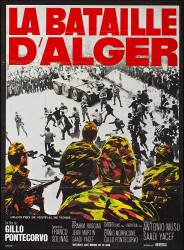Col. Mathieu: Should we remain in Algeria? If you answer "yes," then you must accept all the necessary consequences.
Col. Mathieu: What were they saying in Paris yesterday?
Journalist: Nothing. Sartre's written another article.
Col. Mathieu: Will you kindly explain to me why the Sartres are always born on the other side?
Journalist: So you like Sartre, Colonel?
Col. Mathieu: Not really, but I like him even less as an adversary.
Col. Mathieu: To know them means to eliminate them. Consequently, the military aspect is secondary to the police method.
Ben M'Hidi: Jaffar says you weren't in favor of the strike.
Ali La Pointe: No, I wasn't.
Ben M'Hidi: Why not?
Ali La Pointe: Because we were ordered not to use arms.
Ben M'Hidi: Acts of violence don't win wars. Neither wars nor revolutions. Terrorism is useful as a start. But then, the people themselves must act. That's the rationale behind this strike: to mobilize all Algerians, to assess our strength.
Col. Mathieu: We aren't madmen or sadists, gentlemen. Those who call us Fascists today, forget the contribution that many of us made to the Resistance. Those who call us Nazis, don't know that among us there are survivors of Dachau and Buchenwald. We are soldiers and our only duty is to win.
Ben M'Hidi: It's hard to start a revolution. Even harder to continue it. And hardest of all to win it. But, it's only afterwards, when we have won, that the true difficulties begin. In short, Ali, there's still much to do.
Col. Mathieu: Interrogation becomes a method when conducted in a manner so as always to obtain a result, or rather an answer. In practice, demonstrating a false humanitarianism only leads to ridiculousness and impotence. I'm certain that all units will understand and react accordingly.
Journalist: The law's often inconvenient, Colonel.
Col. Mathieu: And those who explode bombs in public places, do they respect the law perhaps? When you put that question to Ben M'Hidi, remember what he said?





